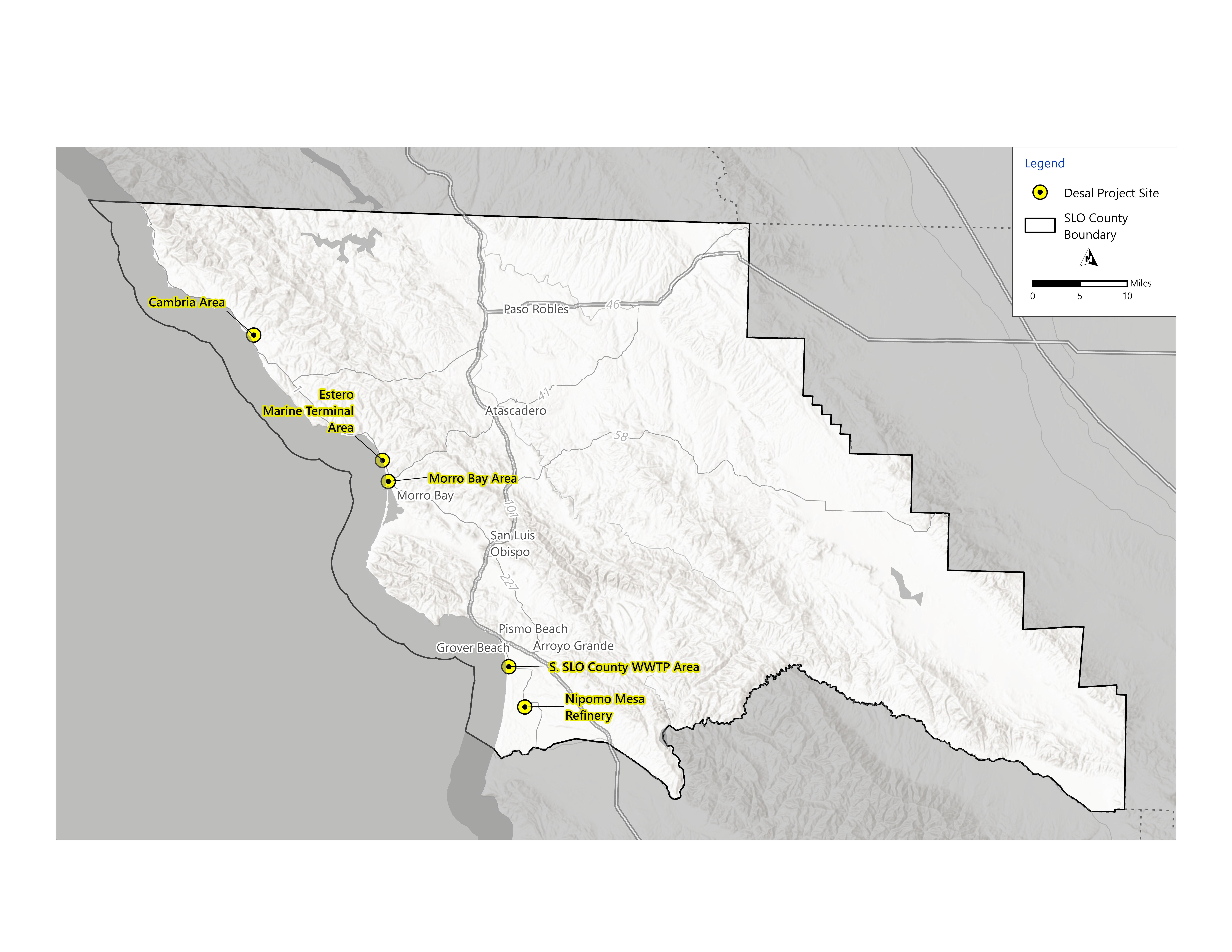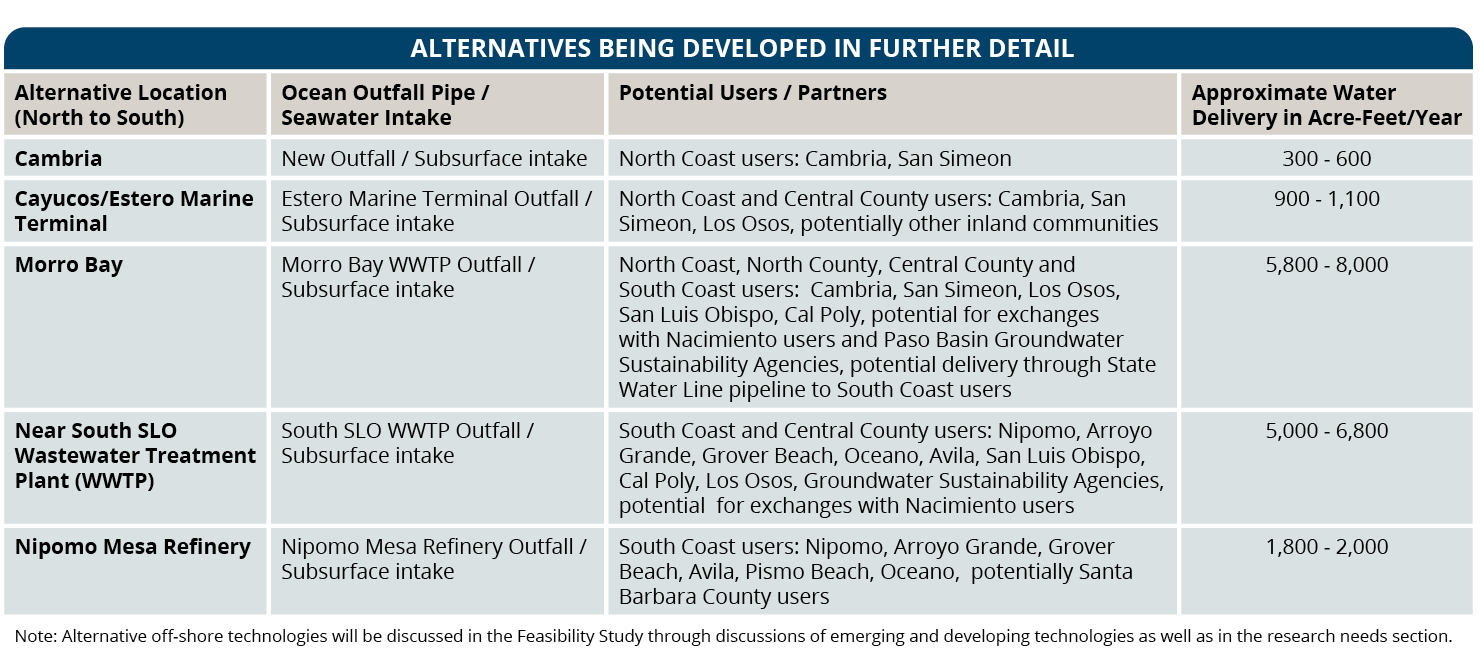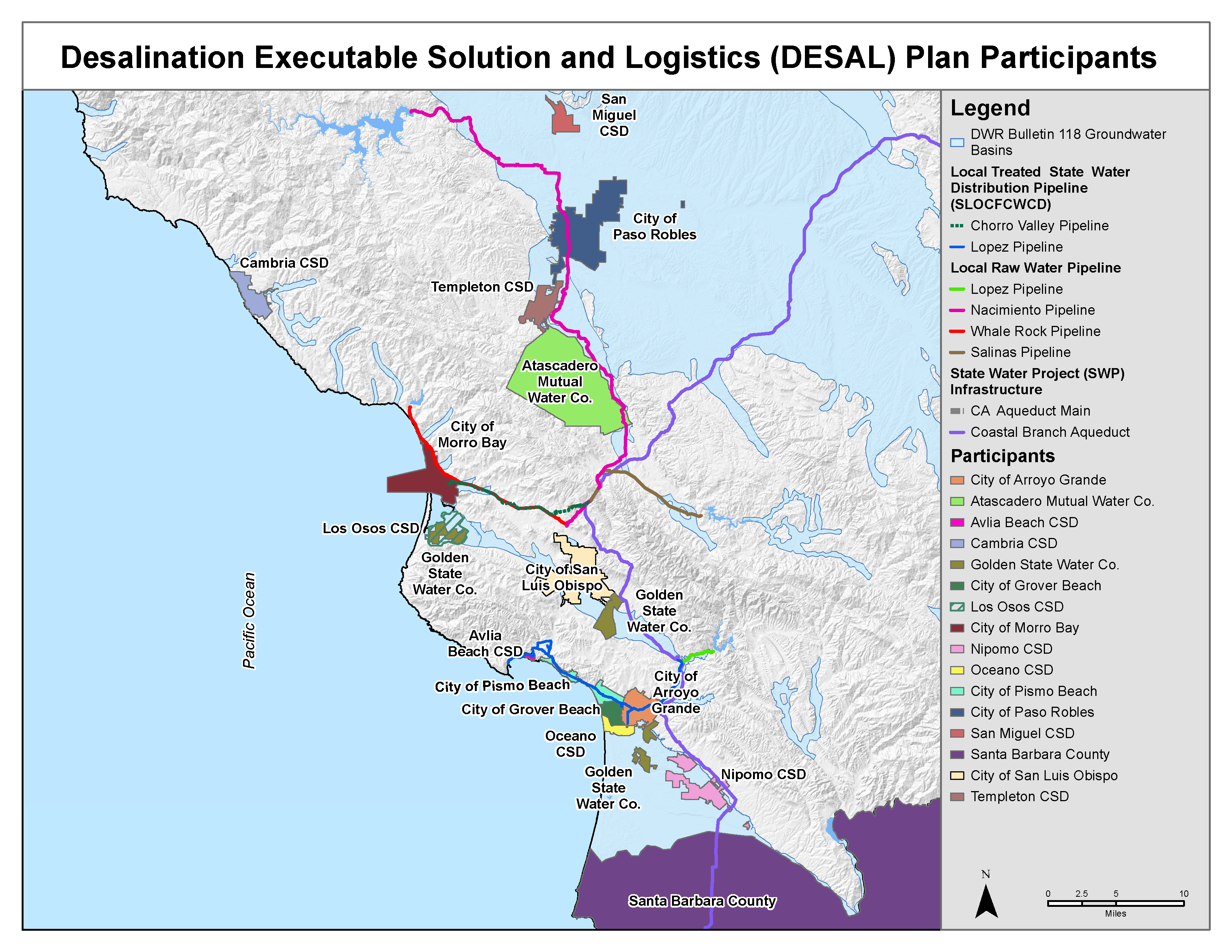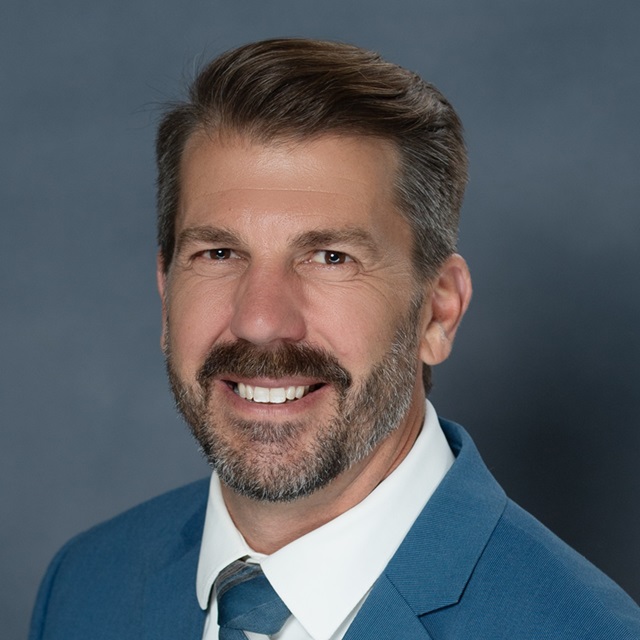Desalination Executable Solution and Logistics Plan (DESAL Plan)
The San Luis Obispo County Flood Control and Water Conservation District (District) is working collaboratively with local partners on a 5-Phase effort to identify and, if feasible and supported, implement a local ocean desalination project. Desalination, the process of removing salt from seawater and/or brackish water to create a freshwater resource, can provide a safe, long-term, droughtproof, and resilient water supply.
As a coastal region, we have a unique opportunity to explore ocean desalination as a reliable and resilient water supply to adapt to climate uncertainties and address our region’s future water needs. A United States Bureau of Reclamation (USBR) WaterSMART grant has provided the San Luis Obispo Countywide region with funding to study the feasibility of developing seawater desalination as a new source of water for our region’s supplies.
Timeline
Desalination projects take decades to plan, permit, and construct. Factors that contribute to the feasibility of a desalination project include demonstrated need for the supply, permitting, funding, facility siting, community support, cultural resources and environmental protection, among others. The District has coordinated with the Countywide Water Action Team (CWAT), an informal working group of staff from entities across the County with water supply planning responsibilities, to create a 5-phased approach to develop a desalination project.
In Phase 1: DESAL Plan Agreement Phase (completed), the District worked with local agencies to confirm their interest, develop an initial planning scope, launch stakeholder outreach, and pursue funding opportunities. During this initial phase, the following agencies became DESAL Plan Partners by formally agreeing to be considered in the DESAL Plan:
- City of Arroyo Grande
- Atascadero Mutual Water Co.
- Avila Beach CSD
- Cambria CSD
- Golden State Water Co.
- City of Grover Beach
- Los Osos CSD
- City of Morro Bay
- Nipomo CSD
- Oceano CSD
- City of Paso Robles
- City of Pismo Beach
- San Miguel CSD
- Santa Barbara County
- City of San Luis Obispo
- Templeton CSD
The District and the DESAL Plan Partners are in Phase 2: DESAL Planning Phase which focuses on preparing a USBR Feasibility Study to evaluate and compare desalination project alternatives. By the end of this study, the District will have developed informed insights into the feasibility of an ocean desalination project. This study will include identifying favorable desalination sites and conveyance configurations associated with project needs while considering the identified environmental and physical constraints of each project alternative. Though no final decisions will be made during this phase, these findings will support meaningful dialogue among partner communities as we help meet the region’s long-term water supply goals and support a water-secure future.
The following is a draft timeline for the anticipated near-term community engagement opportunities:

The following is a draft timeline and description of the long-term planning 5-phases:
Feasibility Plan Status: Quarter 4 - 2025
As identified in the project timeline, the District has completed assessments of potential locations for an ocean desalination facility. Through the investigative process, the District first identified and then evaluated several potential locations. The District and its project partners have reduced the locations to five alternatives by:
- Identifying potential suitable locations
- Evaluating identified locations
- Developing alternatives through combining locations with potential users and infrastructure needs.
To identify the potential locations, the District examined areas based on hydrogeologic conditions suitable for subsurface ocean water intakes and outfalls.
The potential locations were evaluated based on technical criteria to identify areas of least potential impact to the environment and the surrounding community, outfall limitations, and the ability for a desalination facility in that location to provide water supply to the potential partner communities.
Each location was then developed into an alternative by paired the location with potential water usage demands, pipeline routes, and desalination facility footprint.
This effort to screen locations and develop alternatives was done with input from the partner agencies as well as based on input received through the community survey, engagement session and WRAC meetings. The result is five potential alternatives identified for further study.
 Five locations/areas identified for further study
Five locations/areas identified for further study
The following table shows the five alternatives that are under consideration and provides insight into some of the considerations for each. Each of these alternatives will be developed further during this feasibility study process to better define supply benefits, to identify infrastructure needed and resulting impacts, and to estimate cost.
 The above table lists alternative locations in geographical order from North to South. Prioritization of alternatives will be determined as the study progresses and will be included in the final feasibility study.
The above table lists alternative locations in geographical order from North to South. Prioritization of alternatives will be determined as the study progresses and will be included in the final feasibility study.
Updates
- (9/15/2025) Kickoff Virtual Community Engagement Session (video recording) (presentation slides) to inform the public about the DESAL Plan feasibility study, gather input about regional water resources, and solicit perspectives on initial feasibility study elements and ocean desalination.
- (8/25/2025) DESAL Plan - Public Survey posted (survey closed 9/22/2025)
- (6/2/2025) Final Stakeholder Engagement Plan for the DESAL Plan Feasibility Study posted
- (5/23/2025) The Key Opinion Leaders - Interviews Summary was posted
- (5/2/2025) The draft Stakeholder Engagement Plan for the DESAL Plan Feasibility Study posted for public comment until 5/23/2025
Events and Community Outreach
Recent desalination projects within the state of California have taught us that stakeholder outreach and early engagement are critical to a successful desalination project. Meaningful engagement in the early planning phases of the project will allow us to understand the positions and needs of engaged communities and will help potential partners build a broad coalition of supporters, which will be necessary to obtain the required approvals to move forward any project.
Updates on the desalination planning effort will be given as part of the Water Resources Advisory Committee (WRAC) Ongoing Updates. WRAC meetings are open to the public. For meeting dates and locations, please go to www.slocounty.ca.gov/Departments/Public-Works/Committees-Programs/Water-Resources-Advisory-Committee-(WRAC).aspx
- Recent & upcoming DESAL Plan WRAC items can be viewed at the links below:
- 10/1/2025 - WRAC Agenda Item #3: Receive Presentation on the DESAL project and Provide Feedback
- 5/7/2025 - WRAC Agenda Item #4: Receive presentation on the Stakeholder Engagement Plan for the DESAL Plan
- 2/5/2025 - WRAC Agenda Item #3: Receive an update from Staff regarding the recently awarded DESAL Plan contract
- 4/5/2023 - WRAC Agenda Item #7: Receive Presentation from County Staff on the DESAL Plan
The District will hold two community engagement sessions to present key information during development of the Phase 2 USBR Feasibility Study, ask relevant questions to the interested community members, and simply listen to the perspectives of those participating.
The District hosted a Kickoff Virtual Community Engagement Session on Monday, September 15, 2025 at 5:00 p.m. A recording of the session is available here, and the presentation slides can be viewed here. The next community engagement session is anticipated early 2026.
Interested community members should sign up for the email list (link below) to stay informed about upcoming events and milestone project updates.
Join our Mailing List
- Click here to join the County of San Luis Obispo's DESAL Plan mailing list.
Submit a Public Comment
- Click here to fill out a public comment form on the DESAL Plan, draft documents, or to share general feedback on the desalination planning effort.
FAQs
Desalination is the process of removing salt from water. There are multiple desalination technologies, however seawater/ocean desalination for potable water supplies is most commonly produced by membrane separation (reverse osmosis, “RO”). Desalinated water can serve as a new water source to meet various demand types, such as for municipal supply, agricultural/landscape irrigation, groundwater replenishment, and seawater intrusion mitigation.
In the county and across the State, existing conditions and future projections indicate that water security is declining as demands increase and available supplies and their reliability decrease.
The District has implemented / planned for water supply strategies including conservation, stormwater capture, Nacimiento Water Project optimization, Lopez Water Project spillway raise and optimization, Salinas Dam transfer and spillway raise, State Water Project and Water Management Tools, recycled water, produced water from oil extraction, and cloudseeding, to increase regional resiliency. A presentation on these efforts, provided to the District Board 2021, is available here: https://agenda.slocounty.ca.gov/iip/sanluisobispo/agendaitem/details/13094.
These efforts help maximize and extend the region’s existing water supplies, but they are not enough to provide long-term water security. Competition for existing water supplies (particularly those that depend on precipitation) in the county and across the state, is anticipated to increase with new regulations related to groundwater/surface water interactions, minimum sustainability thresholds on groundwater supplies, water quality, environmental flows, and housing directives. Relying on water sourced from precipitation from outside San Luis Obispo County (imported water) is also challenging due to the county’s relative geographic isolation, energy costs to move water long distances, and fluctuating supplies year to year. A new drought-proof, local water supply would help sustain the region’s existing and projected population. With a coastline of over 90 miles, desalination in San Luis Obispo County is a realistic opportunity.
Grants are, and will continue to be, pursued to offset project costs throughout all DESAL Plan phases. Currently, the County is conducting a feasibility study funded in part by USBR's WaterSMART: Water Recycling and Desalination Planning grant. San Luis Obispo County’s application is available here and USBR's awards, including $548,410 to the County, are listed here.
Estimating costs associated with building and maintaining a project and how it will be funded is a part of the DESAL Plan development process.
Although a seawater desalination project has the potential to be situated at a variety of locations along approximately 90-miles of coastline within San Luis Obispo County, DESAL Plan Partners will need to narrow feasible locations through careful consideration of factors such as appropriate land use, location of sensitive habitat and protected areas (e.g., marine protected areas, cultural resources), siting concerns related to the coastal zone, and proximity to power and pipeline infrastructure. The project location, size, water production, etc. are being evaluated during the USBR Feasibility Study.
The best available technology and methods to meet regulations and mitigate environmental impacts will be vetted during the USBR Feasibility Study and in subsequent project development stages. The State of California’s Ocean Plan requires use of best available site, design and technology to minimize intake and mortality to marine life (from the water intake and outfalls into the ocean). There are several technologies available to protect marine life, and it is anticipated that they will continue to evolve during the planning phases along with guidance from the State and regulatory agencies.
County board items related to desalination can be viewed at the links below:
- 1/14/2025: Request to approve and execute contract with Carolo Engineers for DESAL Plan initial phase
- 4/18/2023: Resolution designating the Director of Public Works, or designee, as the authorized representative to prepare, review, approve and file an application and execute agreements for the U.S. Department of Interior Bureau of Reclamation
- 10/18/22: Resolution Authorizing Staff to Proceed with Developing the Desalination Executable Solution and Logistics Plan and Authorize the Director of Public Works, or Designee, to Pursue Grants to Offset Project Costs
- 2/15/22: Presentation by the authors of the Stanford University and Massachusetts Institute of Technology (MIT) study titled, “An Assessment of the Diablo Canyon Nuclear Power Plant for Zero Carbon Electricity, Desalination, and Hydrogen Production.”
- 11/16/21: Review and approve Fiscal Year 2022-23 Budget Goals and Policies (Water Resilience, including desalination, prioritized).
- 3/16/21: Presentation on water supply efforts in San Luis Obispo County.
- 3/22/16: Update of the Diablo Canyon Desalination Project with direction to staff to proceed with project development and coordination work, and request authorization of a corresponding budget adjustment in the amount of $900,000 from San Luis Obispo County Flood Control and Water Conservation District Reserves.
- 8/25/15: Submittal of a Desalination Opportunities Summary Report and recommended direction to staff to proceed on emergency and long-term desalination opportunities.
- Developing a Regional Recycled Water Strategic Plan
- Identifying basins requiring a Salt and Nutrient Management Plan
- Leading the development of a Salt and Nutrient Management Plans in the Los Osos Groundwater Basins (through special legislation, the County is the owner/operator of the Los Osos Water Reclamation Facility)
- Developing a characterization study of the Santa Maria Groundwater Basin as a first step to developing a Salt and Nutrient Management Plan
- Supporting the development of a Salt and Nutrient Management Plan for the Paso Robles Groundwater Basin



